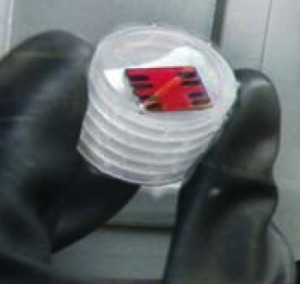Jul 20 2009
Four of R+D Magazine's prestigious R+D 100 Awards for 2009, which recognize the 100 most significant proven technological advances of the year, have gone to researchers at the U.S. Department of Energy's Lawrence Berkeley National Laboratory and their colleagues.
 Nanocrystal Solar Cells
Nanocrystal Solar Cells
"The Department of Energy's national laboratories are incubators of innovation, and I'm proud they are being recognized once again for their remarkable work," said Energy Secretary Steven Chu. "The cutting-edge research and development being done in our national labs is vital to maintaining America's competitive edge, increasing our nation's energy security, and protecting our environment. I want to thank this year's winners for their work and congratulate them on this award."
The awards bring the total of Berkeley Lab's R+D 100 wins to 52 plus two Editors Choice Awards over the years.
Cheryl Fragiadakis, who heads Berkeley Lab's Technology Transfer and Intellectual Property Management Department, says, "To have all of these diverse technologies recognized is a reflection of the quality of scientific work we do at Berkeley Lab as well as the significance of its contribution to society. I am particularly pleased to note that three of this year's winners are joint submissions with partners in the private sector, and all of the technologies are already being used or further developed by partners in the private sector."
The 2009 award designees are:
- EMGeo ElectroMagnetic Geological Mapper - the first commercially available technology for 3-D geophysical imaging of industrial-sized electromagnetic data. It will improve the hunt for energy sources.
- Nanocrystal Solar Cells - the only solar cells that are long lasting and inexpensive enough to produce cost-competitive electricity.
- NEXUS DLC-X Coating System with Pulsed Filtered Cathodic Arc Technology - a system that promises more computer memory at less cost by depositing thin films of diamond-like carbon required by next-generation computer hard-disk heads.
- TEAM Electron Microscope Stage - a device that enables atomic-scale imaging in 3-D. It holds and positions samples inside electron microscopes with unprecedented stability, position-control accuracy, and range of motion.
Berkeley Lab is a U.S. Department of Energy national laboratory located in Berkeley, California. It conducts unclassified scientific research and is managed by the University of California for the DOE Office of Science. Visit our website at http://www.lbl.gov.